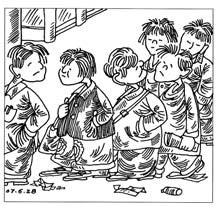Li Xing
Waiting patiently for shorter lines
By Li Xing (China Daily)
Updated: 2007-06-28 06:53
 |
Large Medium Small |
 They say time is money.
They say time is money.
And few people know that better than Jiang Yufeng, a migrant worker from Central China's Henan Province. Jiang runs a licensed business, which involves queuing up on behalf of other people, thus saving them time. In return, her clients pay her well - she makes about 10,000 yuan ($1,300) a month.
She has won appreciation from her clients because they deem her fees reasonable, unlike the scalpers who are despised as they roam around railway stations, in front of theaters and sports stadiums, and in the registration halls of hospitals.
For many Chinese, queuing up was once associated with scarcity. Three decades or more ago, we had to line up for the limited supply of daily necessities and food. Anyone who was late was deprived of the chance to get fresh fish or lean pork.
These days, we don't have to stand in such lines, as food, clothing and other essential items are in abundant supply. People more often find themselves lining up at places such as hospitals and banks.
A friend of mine told me that when she went to the hospital with her husband a few weeks ago, so that he could see a doctor, she had to wait in each line - to pay for treatments, wait for tests, collect medicines - in his stead. She "waited" for a total of about two hours, she said.
The success of Jiang's business clearly indicates that time is more precious and valuable to those who have the money to pay.
However, more Chinese are becoming intolerant of long queues. People spend more time waiting from about 20 minutes in the past to a few hours or more at banks or hospitals today.
The media and the public have criticized hospitals, banks and related government administrations such as the Ministry of Health for the long queues. And large institutions should take the blame. Banks, for instance, have only just started considering ways to cut waiting times - by opening more windows during their service hours, for instance.
Meanwhile, China lacks a comprehensive public healthcare system with a fair distribution of medical resources. As a result, many people go to major hospitals for a simple cold. So while major hospitals are overcrowded with patients queuing for hours, small and community hospitals suffer from a lack of patients.
While it is easy to point fingers at these institutions and governments, we have also overlooked the fact that too many of us Chinese still retain the bad habit of jumping queues, thus allowing Jiang's business, or the business of ticket scalpers to flourish.
Lining up is a way of life common in any country worldwide - developed ones as well - in supermarkets, at entrances and exits to highways, and at bus stops and airports.
I always marvel at people's patience and order when I travel overseas. I still remember the long single file of cars on St Patrick Street leading to King Edward and Hull in Ottawa.
More often than not, it is a Chinese who is more impatient than everyone else and looks for a shortcut. Perhaps it is the mentality of "Me first or else I'll get none", which took root in times of extreme shortages that still feeds such a bad habit.
It is worst during rush hours. At the intersection near my office, drivers shoot straight through red lights, make left turns, right turns and U-turns regardless of who or what lies in their way.
While people need to kick their bad habits and learn to live with the fact that sometimes you have to just stand in line, institutions that serve the people must do more to help reduce waiting times. The shorter the time a client waits, the more people the institutions serve.
And after all, time is money.
E-mail: lixing@chinadaily.com.cn
(China Daily 06/28/2007 page10)
| 分享按钮 |